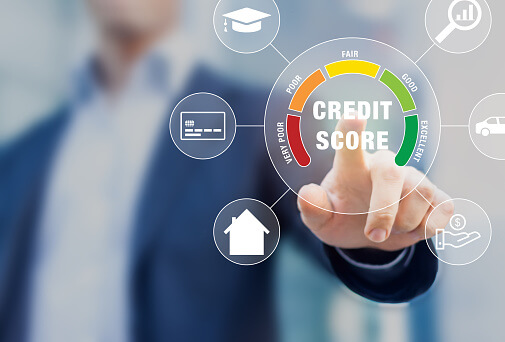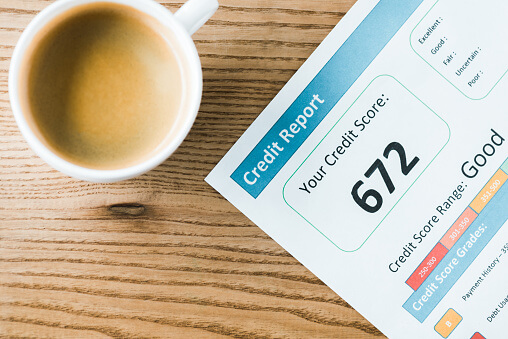When you're just starting your business, you have a lot to think about - one aspect to consider is the business account. If you want to be taken seriously as a business owner, then you also need a good credit history.
With this in mind, does opening a business bank account affect credit score? Will poor credit prevent you from getting a business account? The answer to that is: it depends. Read on to find out more on the matter.
Note: If you want a business bank account, then try Bonsai's business account for consultants, coaches, lawyers and other professional services. Our checking account has no hidden fees or minimums and is simple to create. Our account can help you manage your finances, save on taxes, and get paid faster. Try it our for yourself. Sign up today. If you are looking for the best bank for home services, construction, barbers, or freelancers check out BlueVine as a great option!
What Is Business Credit?
When you get a business credit card, you begin building a credit score and a credit history. Similar to your personal credit, the business score fluctuates based on your credit length, payment history, business credit card activity, and other credit-based factors.
Unlike personal credit scores that are graded between 300 and 850, a credit score for a business can fall between 1 and 100. Also, while private credit reports are confidential (unless you need a credit check for a credit account), business credit is public.
Some of the activities from business credit cards can affect both your personal and your business credit rating. On the other hand, some activities will only influence your small business credit. It mainly depends on the credit card issuers that you choose to report to, which is why you may want to shop around carefully.

Can a Business Bank Account Affect Your Credit Score Positively?
For the most part, opening a bank account will not affect your credit score in any way, be it your business or personal credit score. Since you are not repaying any credit, the bureaus won't be getting a credit report from you.
If your purpose is to improve your credit score, there are other ways to do that. This can include getting a business credit card, a business loan, or other financing types that deal with credit.
Remember that if you want to improve your credit score, you need to make the repayments on time. Otherwise, your efforts to improve your business account history may just backfire on you.

How Does My Credit Affect the Opening of a Business Bank Account?
While a business bank account may not affect your credit utilization, banks may still check with credit reporting agencies when you are opening a business checking account.
If you have frequent late payments or tend to miss them very often, then it might suggest to the bank that you are not able to secure a business bank account. You may not be getting loans from them, but you still receive certain benefits, which is why they may see you as a risk.
When the bank checks whether they should give you the option of a business account or not, they will go through the following steps.
They May Check Your Personal Credit Score
If you are the sole proprietor of your business with a DBA, you can indeed open a sole trader business checking account. However, if you have a poor credit history, this may not be to your advantage.
If you do, they may link your bank account to your own financial status - which means they will also have to do a personal credit check on you. If you have personal liens against you and overall bad credit, then your business checking or savings account may end up getting seized.
They May Evaluate Your Business Credit
Most banks are simply trying to maintain due diligence, which is why they may do a check on your banking history. They'll look to see whether you had problems with another bank or any problems with late payments.
If you've had problems with other financial institutions, then you may want to resolve them before trying to open a new account. Most banks are likely subscribed to a reporting agency, and since business credit is public, they may just check it.
They May Decide on Account Restrictions
If your personal accounts show that you have poor credit, then you may not be able to reap all the major benefits. If you do manage to get an account, there may be some restrictions, such as a lack of overdraft protection or limits on a credit line.
Some banks such as Bonsai's business account still offer many extra services even if you have weak credit. However, if you want to reap the most out of the account, then you may want to build your credit beforehand.
Can I Still Open a Business Account If I Have Bad Credit?
You may still open a business bank account, even if you have a bad credit score. However, this will depend on the bank or credit union where you are opening your account.
Some financial institutions or online banks such as Bonsai's business account may have no issue providing you with a business bank account. However, if you go for a bigger bank, there is a good chance for your application to be refused.
What Do You Need When Opening a Business Bank Account?
When opening business bank accounts, several things may be required in order to streamline the process. These can include:
- Your employer Identification Number (EIN), your Individual Taxpayer Identification Number (ITIN), or your Social Security Number (SSN)
- Your DBA certification (if needed)
- Documents for personal identification (i.e., your ID card, passport, or driver's license)
- Your business license
- Potential corporate documents, such as a partnership agreement or the Articles of Incorporation
Whether you have credit issues or not, check with the requirements of the bank or the credit union. Some may require a ChexSystems Report in order to open a business account. Others might not check it, as long as you don't have any business loans or credit cards activated. Discover the best no ChexSystems business account.
Sometimes, you may find a financial institution that can offer you something referred to as a "second chance business account." If you've been denied a business account due to bad credit history, then you may be given the option to open such an account for yourself.
Bear in mind that if you have bad business credit, then such an account may entail extra fees. However, the advantage is that you still get access to a business checking account.
Read the full list of business bank account requirements you need to meet in order to open an account.
.jpeg)
How to Protect Your Business Credit Score
Regardless of the status of your credit, there are certain things that you can do in order to improve or protect your credit score. This will also increase your chances of obtaining a small business account, without being hindered by the consumer credit bureaus.
Get a Regular Credit Report
Checking your credit report is very important when you are dealing with multiple credit card payments and loans. Most banks will provide free yearly credit reports, so you may want to take advantage of them.
The more you know about your credit score, the easier it will be for you to fix it. Sometimes, bad credit may simply be caused by a mistake from the credit bureaus, so this will be your chance to take the issue out of your credit history.
Use Your Credit Card Responsibly
Perhaps the best way to protect your credit score is to use whatever credit cards you have responsibly. For example, you may have a high-balance credit card, or you may have multiple credit cards. Fixing those issues can help protect your credit score.
Your payment history on your business credit card will affect your business and personal credit score alike. Skipping into your payments even by a day can also negatively impact credit scores, so make sure that you use them responsibly.
Be Careful with Large Credit Business Purchases
Business credit cards are typically tax-deductible, which is why many business owners are tempted to make large purchases. Plus, with bigger purchases come bigger rewards, which is why many people don't even think twice about making a big purchase.
That being said, big purchases on credit cards can backfire and significantly affect business credit scores. If you need a bigger amount of money, business loans are more advantageous than credit cards.

Fix Your Personal Credit Habits
Many business owners are concerned that their business credit can impact their personal credit, but the concern should be the other way around as well.
If you have poor personal credit history and your personal finances are not in the right place either, then you might find it difficult to improve your business credit. This might also make it difficult for you to open a business bank account Ding, for instance.
This is why you should start fixing your personal credit habits and look for a good financial institution. Bonsai, for instance, allows you to open an account or use a business credit card even if your personal credit report is lacking.
The Bottom Line
Opening a business checking or savings account will not affect your credit score in any way - because after all, you are not dealing with credit. However, some banks may see your poor credit as proof that you are unreliable - in which case, they may not give you an account.
Before opening a bank account, you may want to check with your credit card issuer and see if you can do anything to fix your credit. This will help you reap more financial products once you manage to open an account.






